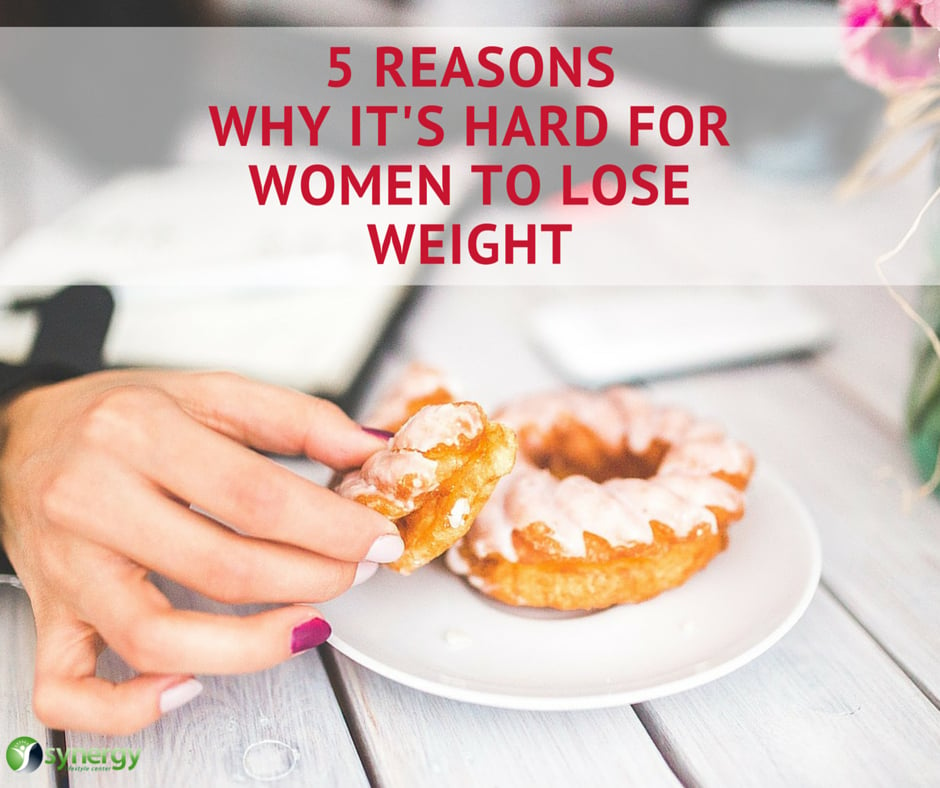
If you’re a woman who had struggled to lose weight, you may have wondered what it is that makes weight loss for women so difficult. As it turns out, there are several reasons why losing weight for women can be challenging.
Metabolism and Muscles
It’s an indisputable, biological fact that men are stronger than women simply because they have more muscle tissue than women. Because muscle nerve cells are constantly active even when they are resting, you’ll naturally burn more calories the more muscular you are. In addition, men tend to be blessed with a faster metabolism — between four and 10 percent higher than most women, according to studies.
Women Eat Too Few Calories When Dieting
Reducing your caloric intake by 500+ calories or more each day may help facilitate weight loss. However, this weight loss result won’t continue, because your body starts to “think” that something bad is affecting the availability of food. An evolutionary adaptation that allowed us to survive food shortages millions of years ago, this “starvation” mode your body swings into dramatically reduces your energy metabolism. When you severely deprive your body of food, this adaptation naturally kicks in, inhibits weight loss and quickly wanes your interest in sticking to a diet.
Women and Thyroid Disease
Hypothyroidism, or an underactive thyroid, may be preventing weight loss even though you are dieting and exercising. Women suffer from undiagnosed hypothyroidism much more than men due to the complex interaction of hormones in their bodies as they go through puberty, pregnancy, childbirth and menopause. The main regulator of metabolism, the thyroid malfunctions for a number of reasons, including overconsumption of soy products, exposure to radiation or radiation treatments, carrying a genetic predisposition for underperforming thyroid, fibromyalgia, smoking and comorbidity with an endocrine or pituitary disease.
Ghrelin and Leptin
After a workout, women experience spikes in a hormone called ghrelin, which signals the brain that they need to refuel — in other words, EAT. At the same time ghrelin is compelling you to pull into the nearest Taco Bell, another hormone called leptin is plummeting. Leptin is the “satiety” hormone that tells the brain you’re full — at least it’s supposed to tell your brain you can’t eat another bite. Of course, men don’t have this problem because they don’t have to deal with wildly fluctuating hormones. Lucky them!
Women and Resting Metabolic Rate
If you’ve been dieting and exercising long enough to lose 20 pounds but have suddenly stopped losing weight, your resting metabolic rate, or RMR, may have changed. RMR is the amount of energy needed to remain alive while sedentary. Several variables contribute to determining RMR, such as amount of muscle mass, age, genetics, hormones and cold or hot climate. Women are especially sensitive to the influence of these variables on their resting metabolic rate, especially hormones, muscle mass and age. Consequently, women tend to have a lower RMR than men.
Is It Impossible to Lose Weight?
Synergy Welness Center’s response to that question is a loud, emphatic NO! Call us today to find out about how to lose weight for women with our comprehensive medical weight-loss programs that are professionally customized to address your unique weight-loss issues. While there’s no easy weight loss for women, Synergy can definitely help you reach your weight-loss goals with healthy lifestyle choices that won’t put you in “starvation” mode.


